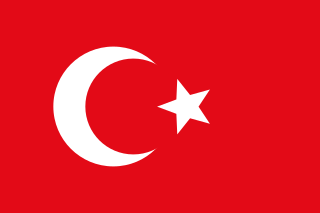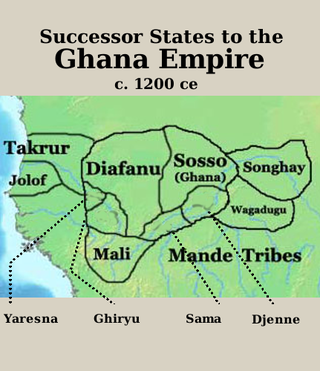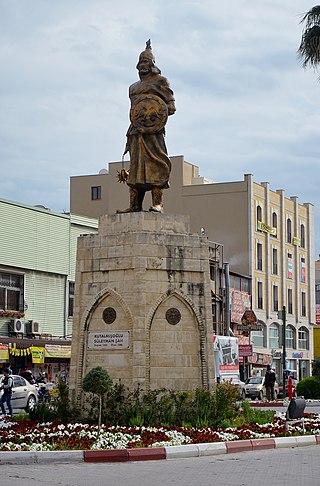
The Ottoman Empire, historically and colloquially the Turkish Empire, was an empire that controlled much of Southeast Europe, Western Asia, and Northern Africa between the 14th and early 20th centuries. It was founded at the end of the 13th century in northwestern Anatolia in the town of Söğüt by the Turkoman tribal leader Osman I. After 1354, the Ottomans crossed into Europe and, with the conquest of the Balkans, the Ottoman beylik was transformed into a transcontinental empire. The Ottomans ended the Byzantine Empire with the conquest of Constantinople in 1453 by Mehmed the Conqueror.

In Islam, the ulama are the guardians, transmitters, and interpreters of religious knowledge in Islam, including Islamic doctrine and law.

Takrur, Tekrur or Tekrour was an ancient state of West Africa, which flourished roughly parallel to the Ghana Empire.
Abu Abd Allah Muhammad ibn Ishaq ibn Yasar al-Muttalibi, commonly known as Ibn Ishaq, was an 8th-century Muslim historian and hagiographer. Ibn Ishaq collected oral traditions that formed the basis of an important biography of the Islamic prophet Muhammad.

Suleiman Shah I ibn Qutalmish founded an independent Seljuk Turkish state in Anatolia and ruled as Seljuk Sultan of Rûm from 1077 until his death in 1086.

Abdal Hakim Murad is an English academic, theologian and Islamic scholar who is a proponent of Islamic neo-traditionalism. His work includes publications on Islamic theology, modernity, and Anglo-Muslim relations, and he has translated several Islamic texts.
The historiography of early Islam is the scholarly literature on the early history of Islam during the 7th century, from Muhammad's first purported revelations in 610 until the disintegration of the Rashidun Caliphate in 661, and arguably throughout the 8th century and the duration of the Umayyad Caliphate, terminating in the incipient Islamic Golden Age around the beginning of the 9th century.
Marshall Goodwin Simms Hodgson, was an Islamic studies academic and a world historian at the University of Chicago. He was chairman of the interdisciplinary Committee on Social Thought in Chicago.

Michael Allan Cook FBA is a British historian and scholar of Islamic history. Cook is the general editor of The New Cambridge History of Islam.
Hugh Nigel Kennedy is a British medieval historian and academic. He specialises in the history of the early Islamic Middle East, Muslim Iberia and the Crusades. From 1997 to 2007, he was Professor of Middle Eastern History at the University of St Andrews. Since 2007, he has been Professor of Arabic at SOAS, University of London.

Islam is an Abrahamic monotheistic religion centered on the Quran and the teachings of Muhammad. Adherents of Islam, called Muslims, number approximately 1.9 billion globally and are the world's second-largest religious population after Christians.
This is a timeline of Yemeni history, comprising important legal and territorial changes and political events in Yemen and its predecessor states. To understand the context to these events, see History of Yemen. See also the List of rulers of Saba and Himyar, the list of Imams of Yemen and the list of presidents of Yemen.
The composite Turko-Persian, Turco-Persian or Turco-Iranian tradition was a distinctive culture that arose in the 9th and 10th centuries in Khorasan and Transoxiana.

The historicity of Muhammad refers to the study of Muhammad as a historical figure and critical examination of sources upon which traditional accounts are based.
Dr. María Isabel Fierro Bello is a researcher on Middle Eastern studies at the Spanish National Research Council's humanities branch in Madrid, Spain. Fierro has served as a visiting scholar at the University of Chicago Divinity School in Chicago, the School for Advanced Studies in the Social Sciences in Paris, The Institute for Advanced Studies at The Hebrew University of Jerusalem and the Institute for Advanced Study in Princeton. In 2020 she was elected to the American Philosophical Society.
The Jat people are a traditionally agricultural community in Northern India and Pakistan. Originally pastoralists in the lower Indus river-valley of Sindh, Jats migrated north into the Punjab region in late medieval times, and subsequently into the Delhi Territory, northeastern Rajputana, and the western Gangetic Plain in the 17th and 18th centuries. Of Hindu, Muslim and Sikh faiths, they are now found mostly in the Indian states of Punjab, Haryana, Uttar Pradesh and Rajasthan and the Pakistani provinces of Sindh and Punjab.

The Cambridge History of Islam is a two volume history of Islam published by Cambridge University Press in 1970 and edited by Peter Holt, Ann K.S. Lambton, and Bernard Lewis. It was reprinted in 1977 with amendments and each volume divided into two for ease of use. It was replaced by the six-volume New Cambridge History of Islam in 2010.
Chase F. Robinson is an American historian of Islam, who is currently Dame Jillian Sackler Director of the Arthur M. Sackler Gallery and the Freer Gallery of Art of the Smithsonian Institution. Prior to assuming this role, he served as President and Distinguished Professor at The Graduate Center at City University of New York. He was formerly a fellow of Wolfson College at the University of Oxford from 1993 until 2008. Robinson received his bachelor's degree from Brown University and his Ph.D. from Harvard University. Fluent in French, he spent his junior year of high school at School Year Abroad's France campus, and has additionally studied at The American University in Cairo and the Hebrew University of Jerusalem. He is the editor of the first volume of The New Cambridge History of Islam.
André Wink is an emeritus professor of history at University of Wisconsin, Madison. He is known for his studies on India and the Indian Ocean area, particularly over the medieval and early modern age. He is the author of a series of books published by Brill Academic, Oxford University Press, and Cambridge University Press on al-Hind – a term used in Arab history to refer to the Islamized regions in the Indian subcontinent and nearby regions.
Seema Alavi is an Indian historian. She is a professor of history at Ashoka University, India and specializes in medieval and early modern South Asia.









